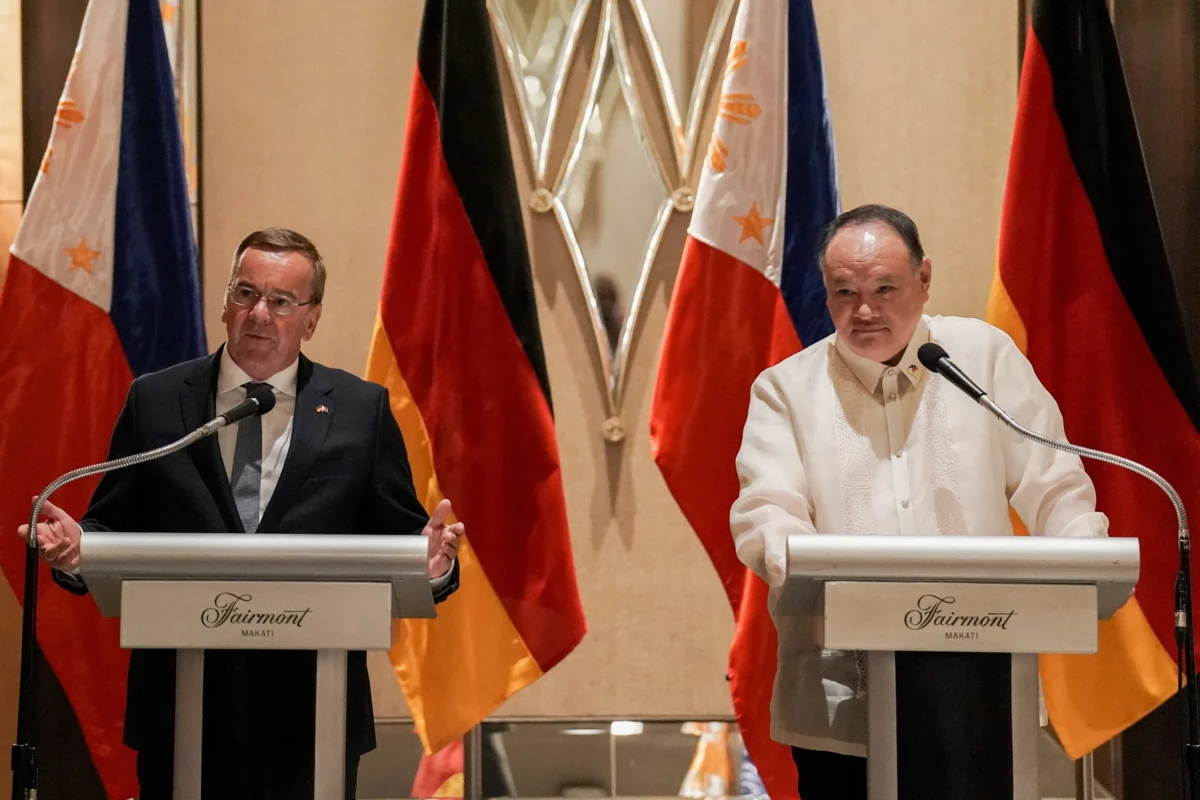The Philippines and Germany have agreed to widen joint defense strategies in the South China Sea.
Defense ministers of both countries said on Aug. 4 that a cooperative agreement, in line with the international rules-based order, will be signed this year.
The agreement comes amid the Chinese Communist Party’s (CCP’s) aggressive actions to advance its claims, already denied by the Permanent Court of Arbitration in the Hague, in the South China Sea that conflict with the internationally recognized territorial boundaries of other Asian nations like the Philippines and many others.
Recent clashes within the Philippines’ exclusive economic zone have sparked tensions after China intentionally collided with Manila’s navy boats that were on a resupply mission in its territorial waters, resulting in serious injury to a Filipino sailor. Beijing has denied being an aggressor, claiming that its actions were lawful and professional according to its territorial claims.
German Defense Minister Boris Pistorius and his Philippine counterpart Gilberto Teodoro asserted their commitment for increased cooperation, as well as joint military training and exercises between their armed forces, during the talks.

During the German defense minister’s visit, which marked the first of its kind, both countries aimed at strengthening their diplomatic relations, first established 70 years ago.
The South China Sea has been subject to multiple disputes between China and many of its neighbors, including Taiwan, Vietnam, the Philippines, Malaysia, Brunei, and Indonesia.
While the CCP claims sovereignty over much of the South China Sea, the Permanent Court of Arbitration in the Hague ruled in 2016 that China’s claims had no legal basis—a decision which Beijing has repeatedly rejected.
“This ruling remains valid, without any exceptions,” Pistorius said. “It is our obligation to strengthen the maritime border and we are living up to it.”

Defense Cooperation
According to Teodoro, the Philippines is looking to Germany for the potential supply of armaments and other defense capabilities to strengthen its own defense arsenal.
“These are in the command and control, anti-access aerial denial, maritime domain, aerial domain, and in higher technologically capable equipment,” Teodoro, alongside Pistorius, told a press conference.
The CCP has been highly critical of the increased defense cooperation between multiple Asian nations such as Japan, South Korea, and the Philippines, and NATO members—specifically as Washington and other NATO allies—who have widened their relations and partnerships on a global scale.
Moreover, on Aug. 2, Germany joined the U.S.-led U.N. Command in South Korea, which will make it the 18th nation to pledge defensive action against North Korea in the event of a war.
The move signifies the view between both European and Indo-Pacific liberty-minded allies of the importance of joint security efforts for the Indo-Pacific region, which Pistorius said are not directed against any specific nation but rather are to ensure freedom of navigation and open trade routes.
In the South China Sea lies a major global trade route that supports several trillion dollars in annual global trade.
While Teodoro denied any attempts of provocation against China, he reaffirmed his country’s view that China’s ruling CCP has been the common denominator in regards to regional conflict, in which it seeks to “appropriate most, if not all, of the South China Sea.”
Reuters contributed to this article.
